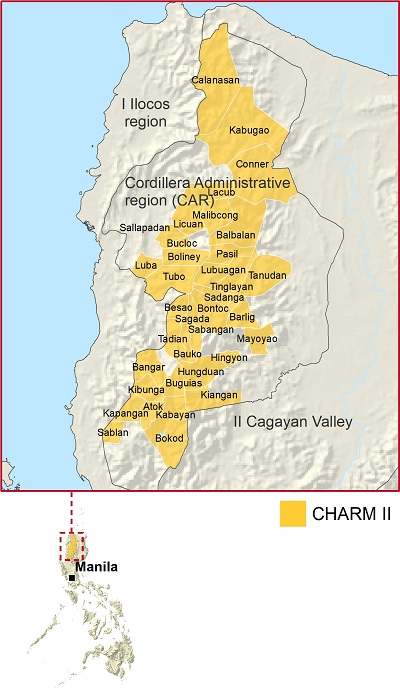Second Cordillera Highland Agricultural Resource Management Project (CHARMP)
IFAD Asset Request Portlet
Asset Publisher
Second Cordillera Highland Agricultural Resource Management Project
The project builds on the first Cordillera Highland Agricultural Resource Management Project (CHARMP), which has contributed to reducing poverty among indigenous peoples in the highlands of Cordillera Region in northern Philippines. The second CHARMP concentrates on areas where poverty is most severe in all six provinces of the region: Abra, Apayao, Benguet, Ifugao, Kalinga and Mountain Province.
The aim is to reduce poverty and improve the livelihoods of indigenous peoples living in farming communities in the mountainous project area. The indigenous peoples consist of many tribes whose main economic activity is agriculture. More than half of the people in the area are poor.
The objectives are to:
- increase household income of poor farmers through sustainable agricultural development
- enhance the quality of life in the communities by improving land tenure security, food security and watershed conservation
In line with IFAD's strategy of supporting sustainable natural resource management, the project focuses on the value of indigenous farming systems, which are environmentally sustainable. The aim is to increase the added value of products from farming systems that are both organic and environmentally sustainable. The project supports the government's decentralization policy by promoting the participation of local communities in planning activities, and by supporting local government units providing services to the communities. It also supports implementation of the Indigenous Peoples Rights Act, landmark legislation that recognizes the values and institutions of indigenous people and their right to manage the natural resources in their domains.
The project builds on the innovative features of the first Cordillera operation, which included:
- involving communities in development planning and natural resource management
- supporting indigenous peoples in gaining title to ancestral domains and lands
- identifying and documenting best practices in the application of indigenous knowledge systems and practices
- using broadcast media to reach remote areas
- involving local provincial units as implementation agencies for rural infrastructure
The second CHARMP introduces new forms of innovation, such as commercialization of indigenous peoples' products through value chain development and market linkages. It also strengthens participatory systems of monitoring and evaluation of project activities, and the capacity of indigenous peoples and their councils of elders to assume responsibility for forest management. In addition, the project empowers municipalities to authorize project disbursements to agencies implementing activities.
The main focuses of the CHARMP2 are:
- mobilization of communities, participatory planning of investments and land titling
- community watershed conservation, including forest management and agroforestry development
- agricultural and agribusiness development and promotion of income-generating activities
- development of rural infrastructure
IFAD will directly supervise the project.
